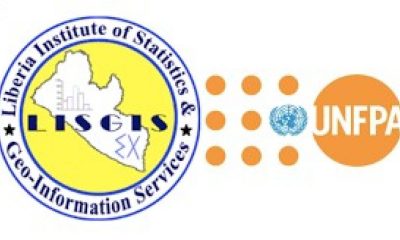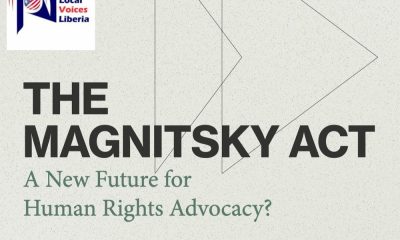
Paynesville – In Liberia, there are three brands of COVID-19 vaccines available to the public, according to the National Public Health of Liberia (NPHIL). In this explainer, we’ll tell you some of the important facts about the Oxford-AstraZeneca, Pfizer, and the Johnson & Johnson vaccines.
Report By: Grace Z. Gaie | LVL Fact Checker
On January 20, 2021, NPHIL Risk Communication lead, Chester Smith disclosed to LVL that the country has received a total of 192,000 doses of the AstraZeneca, 896,000 doses of the Johnson & Johnson jab, and 320,580 doses of the Pfizer vaccine. This means the cumulative total doses of Covid-19 vaccines that have been donated to Liberia is 1,408,580 – this number represents all the three types of vaccine that came in the country.
Now that we know the total doses of COVID-19 vaccines brought into the country, let’s give you some important details about the vaccines.
First, the Pfizer Vaccine.
Pfizer, also known as Pfizer-BioNTech, is an American multinational pharmaceutical and biotechnology corporation founded in 1849. On December 31, 2020, the World Health Organization issued the company an emergency use validation for COVID-19 vaccine, making the Pfizer vaccine the first to receive such approval. Emergency use validation is when regulators allow a vaccine to be given to certain people while studies of safety and effectiveness are still ongoing.
For now, people aged five and above are qualified to take the Pfizer vaccine, according to the WHO. But there is an adjustment in the recommended dosage for those between the ages 5 and 11. For those aged 12 and above, they are required to take two doses while a second dose is required 21 days after the first. However, people with weak immune system are advised to take a third dose 28 days after completing the second dose.
Who shouldn’t Get Pfizer?
According to the CDC, people with severe allergic reaction are advised not to take the vaccine, If you experienced severe allergic reaction after getting the first dose of the vaccine, you are asked not to continue with it. Some of the severe allergic reactions can cause a rapid heartbeat, difficulty breathing, swelling of the throat, or a generalized rash or hives. Please look out for these adverse effects.
Also, the UK National Health Service (NHS) named side effects of the Pfizer vaccine to include, a sore arm from the injection, feeling tired, headache, feeling achy, feeling or being sick, swelling, tiredness, headache, muscle pain, and chill fever. However, most side effects are mild and last not more than a week.
Meanwhile, the Pfizer vaccine has a 95% efficacy rate against COVID-19. According to the WHO, “the vaccine has been found to be safe and effective in people with various conditions that are associated with increased risk of severe disease”.
People with hypertension, diabetes, asthma, pulmonary, liver or kidney disease, as well as chronic infections are also protected against severe covid-19 infection once they are vaccinated.
The Johnson & Johnson Jab
The Johnson & Johnson (J&J) or Jenssen was listed for emergency use by the WHO on March 12, 2021. The J&J vaccine is developed by the Janssen Pharmaceutical Companies of Johnson & Johnson. Before the WHO gave the vaccine greenlight, the vaccine also received conditional marketing authorization from the European Commission on March 11, 2021. It is a single dose vaccine in most situation and it is given to people who are 18 years and above.
“The vaccine is safe and effective in people with known medical conditions associated with increased risk of severe disease, such as hypertension, chronic lung disease, significant cardiac disease, obesity, and diabetes,” the WHO recommends on its website.
The Africa Centers for Disease Control has also backed the efficacy of the J&J vaccine, stating that it has demonstrated an efficacy rate of 66% while the WHO finds the vaccine to have an efficacy rate of 85.4% against critical illness and 93.1% against hospitalization.
J&J Side Effects?
There are some common side effects of the J&J like the other vaccines. There might be pain at the injection site, headache, tiredness, muscle pain and nausea. However, these side effects are mostly mild and are over a couple of days after getting inoculated.
And now, let’s talk about the AstraZeneca Vaccine
This vaccine was first authorized for Emergency Use Listing (EUL) by the WHO in February 2021. The jab is a viral vaccine developed in the United Kingdom by the Oxford University and AstraZeneca – a British-Swedish pharmaceutical company. The company operates in over 100 countries and its innovative medicines are used by millions of patients worldwide.
Two doses are taken with an interval of eight to 12 weeks to obtain immunity against Covid-19. This means, after taking the first dose, at most 16 weeks must pass before the second dose is taken. However, this will be based on further recommendation by health authorities.
The Oxford-AstraZeneca vaccine has an efficacy rate of 76% against COVID-19, but this is specific to events after taken the second dose.
Meanwhile, people with a history of severe allergic reaction to any component of the vaccine are advised not to take this vaccine, and people below the age of 18 are not qualified to take the shot. Like every other vaccine, the AstraZeneca vaccine also has side effects like “feeling tired, a headache, feeling achy feeling or being sick”.
You may contact us to fact check any claim or information relative to Liberia. Contact us on:
Factcheck.localvoicesliberia@gmail.com or WhatsApp: +231880986778

Local Voices Liberia is a network of dedicated Liberian journalists based in the 15 counties working to lift the development concerns and progress of rural communities.


Methodology

True
The claim is rigorous and the content is demonstrably true.

Half True
The statement is correct, although it needs clarification additional information or context.

Unproven
Evidence publicly available neither proves nor disproves the claim. More research is needed.

Misleading
The statement contains correct data, but ignores very important elements or is mixed with incorrect data giving a different, inaccurate or false impression.

False
The claim is inaccurate according to the best evidence publicly available at this time.

Retraction
Upon further investigation of the claim, a different conclusion was determined leading to the removal of the initial determination.

Toxic
A rude, disrespectful, or unreasonable comment that is somewhat likely to make you leave a discussion or give up on sharing your perspective. Based on algorithmic detection of issues around toxicity, obscenity, threats, insults, and hate speech;

































































































































































































































































































































































































































































































































































































